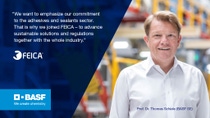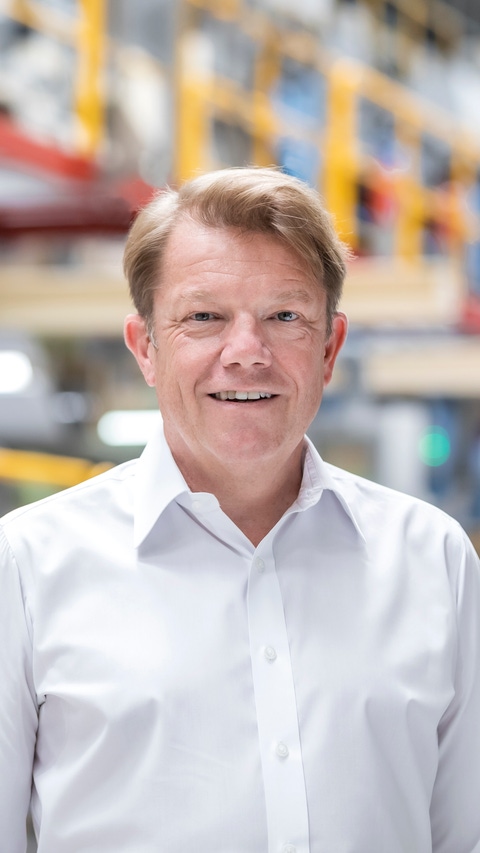Dispersions & Resins
BASF joins FEICA, the European voice of the adhesive and sealant industry
Read the interview between Kristel Ons, FEICA Secretary General & Prof. Dr. Thomas Schiele, Vice President Business Management Adhesives, Fiber Bonding and Paper Coating Chemicals EMEA, BASF SE to find out why BASF and FEICA are a great match!
Kristel, what does it mean to be a partner of FEICA?
FEICA works with its members to create a powerful voice for the adhesive and sealant industry in Europe, constantly seeking to improve the economic and legal landscape for the industry.
FEICA and its members:
-
Work with the European Commission and related bodies to contribute to and influence European legislation, ensuring that it protects human health and the environment without undermining the competitiveness and innovativeness of European industry
-
Share best practice and develop tools in key areas such as sustainability and innovation
-
Raise awareness of the benefits that the industry brings to the economy, its contribution to sustainable development and the attractive careers it offers to talented people
-
Maximize representation of the industry and support SMEs
-
Forge strong relationships with adhesive and sealant organizations around the world to develop international standards and share knowledge
These are just some of the benefits of a FEICA partnership.
Thomas, what is it about FEICA that attracted you and made you want to become a partner?
The partnership with FEICA underlines our long-term commitment to the adhesive industry. As one of the leading suppliers of adhesive raw materials, our role at BASF as we see it, is to actively do everything to reach the challenging goals set by the European adhesive industry.
The European Green Deal and the Circular Economy Action Plan as well as the new Chemicals Strategy for Sustainability contained therein, pose new challenges for the European adhesive industry, especially in view of the introduction of many chemical regulations and directives relevant to the industry that contain very tight timelines. These can only be successfully managed through cooperation within the industry, between different industries and along value chains. BASF sees itself as a global chemical company that takes its responsibilities seriously.

Kristel, talking about the EU Green Deal, could you explain what it is and its importance in the context of FEICA partnership?
The 'European Green Deal' focuses mainly on the importance of circular-economy policies as a part of Europe’s objective to transform itself into a climate-neutral continent by 2050.
FEICA’s support of the EU Green Deal is very significant. Adhesives and sealants typically constitute only a small percentage of the final product of which they are a part. In the majority of applications, adhesives and sealants can play a significant role in delivering the sustainability benefits of a product, particularly in terms of the substrates they are required to bond, the efficiency of the manufacturing process they are used in, the end use of the bonded article, its durability, and the opportunity to recycle the materials used, at the end of its life cycle. Therefore, adhesives and sealants enable customers and industries to operate in a more sustainable manner.
The FEICA Sustainable Development Committee consisting of representatives from Direct Member Companies and National Association Members, monitors sustainable developments across Europe (as well as globally) in order to raise awareness of good practices for our adhesive and sealant members. Via its Good Practice stories, FEICA promotes excellence in how our members run their business processes to improve sustainable operations by, for example, reducing energy and water consumption, and reducing emissions into the atmosphere, water and soil. Many of our member companies are working on novel solutions to improve process sustainability and life cycle performance.
Some key features that are needed for more efficient, and impactful chemicals legislation, are available at FEICA’s Five Guiding Principles in support of a successful European Green deal. More information, as well as FEICA’s ‘Sustainable Development Agenda’, is available at www.feica.eu/our-priorities/sustainable-development.
Thomas, how does this fit in with BASF’s own strategy?
BASF is at the forefront of the sustainability movement in the chemical industry. We have very ambitious targets, and many projects are already in the pipeline. We are striving worldwide to achieve net zero CO2 emissions by 2050 and we want to reduce our greenhouse gas emissions worldwide by 25 percent by 2030 compared with 2018. Apart from electrifying production sites with green power, we will implement fundamentally new, low-emission production processes and switch to bio-based feedstocks to replace CO2 emissions of fossil origin with biogenic CO2 emissions. Key to lower PCF are bio-derived feedstocks.
When it comes to products BASF is already offering ways to significantly reduce the product carbon footprint of its adhesives and adhesive raw materials through the Biomass balance approach. We see an ever-increasing demand for such solutions. Major customers have already started to announce their intention to adjust their purchasing strategies with the aim of sourcing more sustainable products and reducing the PCF.
Another project will allow us to save CO2 by closing the loop: BASF is breaking new ground in plastic waste recycling with itsChemCycling™ project. Plastic waste is converted into oil by BASF’s partners using pyrolysis. The resulting pyrolysis oil is used as feedstock within BASF’s Verbund production. Based on the mass balance approach, the share of recycled raw material can be allocated to all chemicals produced in this Verbund (e.g., adhesive raw materials).
Naturally, there are other important aspects of the European Green Deal that concern us. Adhesives are enablers. We are working on new adhesives that make circular economy possible in many industries, such as recycling friendly systems, adhesives allowing for energy savings or waste prevention or compostable adhesives.
For many years, we have been focusing on the development of adhesive raw materials that do not pose a risk to humans or the environment. It remains our task to provide safe and sustainable adhesive raw materials to the adhesive industry that meet the requirements of the new Chemicals Strategy for Sustainability.
FEICA and BASF have a shared understanding. Hence, in the end, it made a lot of sense to join as an official partner. In addition to our long-standing collaboration in the German Adhesives Association IVK, we decided to join FEICA and support FEICA in its efforts to represent the interests of the adhesive industry when dealing with the European Commission.
Thomas, how important is it for BASF adhesives to align with the adhesive and sealant industry and what are the fields in which this alignment is needed most?
As outlined before, sustainability, which is at the core of our DNA, is one part of the equation. The other important factor is regulation. New chemical regulations and directives, driven by the EU Chemicals Strategy for Sustainability, are about to be enforced within a very tight time frame.
The adhesive industry must understand the consequences resulting from CSS and speak with one voice when dealing with the European Commission. These issues can only be successfully mastered through cooperation within the adhesive industry.
We will contribute our expertise in the field of chemistry as well as our knowledge of regulatory matters. This is where I see our value as a FEICA partner.


